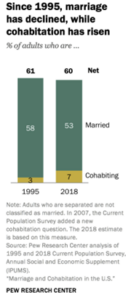Planning for the Modern Relationship-DINK

 Many young couples in the United States are enjoying the “Dual Income No Kids” (DINK) lifestyle. A large category of DINKs are unmarried. According to the 2008 census report, there were 6.2 million unmarried partner households in the United States. Pew Research Center reports that since 1995, marriage rates have declined 7% while cohabitation has increased by 4%.[1] Each unmarried partner is typically focused on their career and building their net worth independently of their partner. That means more assets and liabilities to consider when cohabitating with a significant other.
Many young couples in the United States are enjoying the “Dual Income No Kids” (DINK) lifestyle. A large category of DINKs are unmarried. According to the 2008 census report, there were 6.2 million unmarried partner households in the United States. Pew Research Center reports that since 1995, marriage rates have declined 7% while cohabitation has increased by 4%.[1] Each unmarried partner is typically focused on their career and building their net worth independently of their partner. That means more assets and liabilities to consider when cohabitating with a significant other.
Those of us that fall into the unmarried DINK category should have foundational estate planning documents in place. The reality is that your partner is not your legal spouse and neither Texas nor federal law protects us when it comes to financial decisions, medical decisions, and taxes. My recommendations for all similarly situated DINK Young Professionals out there:
- Prepare Financial and Medical Powers of Attorney – You don’t have the right to pick up your partner from day patient surgery without a Medical Power of Attorney or consent to the plumber working on a leaky pipe in the house that does not have your name on the deed.
- Prepare a Cohabitation Agreement – You want to make sure the fear of common law marriage does not stunt the growth of your current relationship. Prepare a Cohabitation Agreement before moving in together to ensure common law marriage is not on the table until you both want it. This simple agreement allows you to create a joint financial plan and the peace of mind in knowing a potential breakup will not be served with divorce papers. If you plan to purchase property together, you should prepare a property agreement to characterize the joint ownership as your separate property and confirm the percentage ownership.
- Write a Will – all of the assets that you are accumulating are your separate property and will not transfer to your partner by default state law in the event of your passing.
It is important to have these documents in place because you never know what life will throw your way. In the case of any financial, medical or relationship matters, you want to have a plan arranged before a problem arises.
These materials are made available by Stibbs & Co., P.C. for informational purposes only, do not constitute legal or tax advice, and are not a substitute for legal advice from qualified counsel. The laws of other states and nations may be entirely different from what is described. Your use of these materials does not create an attorney-client relationship between you and Stibbs & Co., P.C. The facts and results of each case will vary, and no particular result can be guaranteed. The facts and results of each case will vary, and no particular result can be guaranteed.
[1] The state of marriage and cohabitation in the U.S. | Pew Research Center

